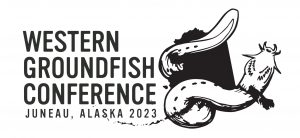Abstracts

2023 WGC Session Themes
The Western Groundfish Conference is no longer accepting abstract submissions for the April 2023 conference in Juneau, Alaska. Please see guidelines below for any abstracts that were accepted.
This session focuses on groundfish general biology and life history characteristics. Specific topics may include research on morphology, physiology, anatomy, behavior, evolution, growth, reproduction, and other related topics.
This session features research on interactions of groundfish with each other, other species, and their habitat. Topics may include groundfish spatial distributions, foraging ecology, and relationships with biological and physical attributes of the environment. Topics that examine the interactions of fisheries and habitat are also encouraged.
This session focuses on developments in groundfish stock assessment and fisheries management. Encouraged topics are: methods for including ecosystem data directly into assessment models, novel survey designs and technologies for abundance estimation, innovation in the use of fishery data and local and traditional knowledge, and communication tools for assessment results. Management topics may include the use of socioeconomic data in quota setting, bycatch research in support of management, spatial tools, and electronic monitoring.
This session focuses on groundfish research or management issues caused by accelerating change in the ocean related to climate change and other societal impacts of global changes. Specific topics may include changes in reproductive success, growth rates, migration, or trophic dynamics, potential impacts of introduced species or diseases, ocean acidification, ecosystem responses to marine heat waves, unique challenges for stock assessment and management, human dimensions, and potential investments in research, technology, and conservation strategies to help address or prepare for these changes.
The COVID-19 pandemic caused unprecedented disruptions of fisheries research, surveys, and monitoring, resulting in major data gaps needed for management and conservation globally, as nearly all activities were suspended until best safe practices were established. This data loss poses challenges for ecosystem science and the development of future fishery stock and ecosystem assessments that are used to manage and inform decisions regarding marine resources. Furthermore, with increased climate changes impacting coastal ocean ecosystems, the loss of ecosystem monitoring data could make it more difficult to interpret interannual changes in fished resources and conservation of protected species. The TSC invites individuals and organizations to share their lessons learned and how they have adapted, based on the latest science and technology, including sampling design considerations and collaborative efforts to reduce impacts or costs. We encourage and set the stage for organizations to share best practices and experiences on the tools and strategies that have successfully overcome the challenges posed by the ongoing pandemic. Finally, as working from home with kids and pets video-bombing meetings has become commonplace, we encourage discussions of how agencies have adapted to doing business virtually, while trying to maintain a positive atmosphere and synergy among co-workers and collaborators.
The WGC is an inclusive event and welcomes submissions that may not fit within the previous sessions. If sufficient submissions do not fit within the above described sessions, another session topic may be developed.
Presentation Guidelines
Cancellations
If you are unable to come to the meeting or will be unable to present your poster or oral presentation for any reason, please contact the WGC Organizing Committee at westerngroundfish@psmfc.org .
Oral Presentations
Guidelines:
Please prepare for a 15 minute presentation, including time for questions and answers (e.g., 12 minutes of content and 3 minutes for questions).
Presentations will be projected on a large screen as well as widescreen TV monitors around the hall. Widescreen (16:9) format is recommended.
Uploading Presentations:
We will use a common computer (PC) and projector for the oral presentations. For smooth transitions between speakers, your digital presentation materials will need to be submitted no later than the afternoon before your talk. Please provide your presentation file at the registration desk so we can pre-load it into our computer system.
Presentation submittals must be made via a USB port and labeled as follows: Presentation number, Last Name, Date, and Time (e.g., 1_3_Squalus_Apr25_945.pptx). Presentation numbers will consist of the session number and the presentation order within that session. Session numbers can be found within the Sched agenda. For those of you using Mac computers – please bring your computer with you when submitting materials to ensure the transfer to our system is smooth. All presenters should verify that their presentation transfers and plays correctly no later than the afternoon prior to their presentation.
Questions?
Please contact the Presentation Coordinator: chris.lunsford@noaa.gov
Posters
Guidelines:
The maximum width of your poster will be 48 inches, side-to-side, either landscape or portrait. Poster panels are 36 inches top to bottom. Materials will be provided for hanging posters.
You may bring handouts of your poster or other related information if desired. You will be asked to provide an electronic version of your poster to be provided to all conference attendees in the program.
You may leave your poster tube in the staging area.
Schedule and Program:
Posters will be displayed on panels at the Alaska State Museum at [395 Whittier St, Juneau, AK 99801]. You may begin putting up your poster by 5:00pm on April 25. The poster session is scheduled on April 25 from 6:00pm to 9:00pm.
Presenters will be asked to stand by their posters at different times to alleviate congestion and to help judges with time constraints. We are calling these time periods “waves.” Poster presenters will receive an email with their wave and numbered location assignments. A diagram with locations of all the poster presenters and when they are to be at their station will be available in the registration packets and on this web site at a later date.
Take Down:
All posters must be taken down by 9:30pm on April 25. If you do not remove your poster by this time, it will be removed by conference volunteers and left at the conference registration table at EPH. Once the conference is over, any remaining posters will be disposed.
Questions?
Please contact the Presentation Coordinator: katy.echave@noaa.gov
